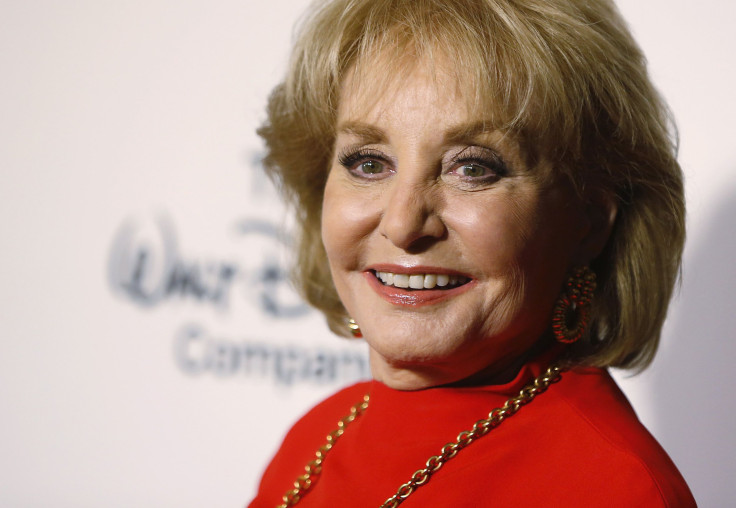What Will Retiring Barbara Walters Be Most Remembered For -- Her Trailblazing Role In Television, Making her Interview Subjects Cry, Or Being Parodied By Gilda Radner?

Throughout Barbara Walters’ 50-year television career, the perennial question was: When will she make them cry? In a Walters interview, that was the money shot: the moment everyone waited for, to see her hit pay dirt.
Though her focus on celebrity pathos caused some to consider her a media lightweight -- particularly early in her career, Walters’ informed and sympathetic interview style served her well, enabling her to surge past the gender barriers of 1960s network TV to become as well known as the people she interviewed. She was also famously lampooned in Gilda Radner’s famous “Baba Wawa” comedy sketch on "Saturday Night Live."
Walters made a name for herself for being knowledgeable about her interview subjects, for her willingness to go deep and long, and for her unexpectedly pointed questions, posed to subjects who had been strategically softened for the kill.
“I don’t think she was the greatest journalist that ever lived. I think she was very good at what she did,” said Robert Thompson, director of the Bleier Center for Television & Popular Culture at Syracuse University. “She had conversations with people and interviews that [Edward R.] Murrow could have never managed.”
“She got the interviews that other people couldn’t,” said Jill Olmsted, director of American University’s journalism division, who credits Walters' unique interview style – in which she is both soft and aggressive -- with getting some of the world’s most powerful leaders, movie stars and criminals to open up on camera.
Now 84, Walters is saying she is ready to sign off. Her interview style -- easily parodied but difficult to emulate -- will likely remain her personal domain. There is no heir apparent. But her enduring legacy may be her final television venue, “The View,” which she created.
“I think her most long-lasting legacy, strangely enough or maybe not, is going to be ‘The View,’” Thompson said. “It’s not that it was a groundbreaking format but it was something new. She took a number of elements of daytime talk programming and reconfigured them.”
Over the course of her long career, Walters interviewed every U.S. president since Richard Nixon. Among her early hard-news coups was arranging the first joint interview with Egypt's President Anwar Sadat and Israel's Prime Minister Menachem Begin in 1977. Later, her famous "gets" included a 1999 interview with Monica Lewinsky, which attracted more than 50 million viewers for a two-hour special. Her one-hour primetime conversation with Cuban President Fidel Castro was printed in half a dozen languages and shown all over the world.
Along the way, she become a pop-culture icon, setting the standard by which all other television interviewers are judged. In her final weeks at ABC, she managed to captivate an audience of 7 million people with her exclusive interview with V. Stiviano, the alleged girlfriend of embattled L.A. Clippers owner Donald Sterling.
The obvious question, beyond whether she will disappear from the screen for good, is whether the era of engaging, intensively researched, deeply probing TV interviews is over.
“It’s an overused word, but it’s the correct one. She was a trailblazer,” said Olmsted, who added that she earned her journalism degree the same year that Walters became the first woman to co-host the "ABC Evening News" for a record-breaking $1 million salary and a five-year contract.
That was 1976, and Walters was the only woman in what was then an “old boys' network,” Thompson said. Her co-host, Harry Reasoner, sometimes showed visible disdain toward her, and the animosity was so strong that their partnership was short-lived – within a year she was off the anchor desk and fulfilling her contract by hosting her own television specials.
For Walters, the segue was a blessing in disguise. The TV specials, Olmsted said, “gave her an outlet to create her own persona.”
“She would use her own softness in a way where she showed determination and interest in the people,” Olmsted said. “That’s how she got good answers out of them that they never expected to reveal. She could make them feel like a friend and they would let their guard down, and all of a sudden she would have a scoop.”
Primetime interviews were her mainstay, but Walters also made important inroads into daytime TV. “The View,” which Walters co-owns, co-produces and co-hosts, first aired in 1997, and unlike past daytime programs that relied upon a single host, engaged multiple hosts, all female, some of whom were celebrities.
The format, Thompson said, has been “imitated and ripped off on a number of occasions, but I think that’s going to be a format that’s going to continue to be ripped off for years to come.”
Thompson doesn’t foresee anyone mastering the same terrain, however.
“Everybody asked, Who is going to be the next Oprah,” he observed. “The answer to that question is, there isn’t going to be a next Oprah. The idea that Barbara Walters is occupying a position that will have to be filled by somebody else is not the way it works.”
Still, Walters is seen as a pop-culture icon that couldn’t escape criticism. SNL’s Gilda Radner, Rachel Dratch and Cheri Oteri each poked fun at Walters' interview questions, demeanor and tear-inducing abilities. Even Walters herself says this is what makes her memorable. “Gilda was so wonderful — the sketch immortalized me,” Walters said in 2012 recalling Radner’s famous “Baba Wawa” skit, “but at the time I wasn’t so thrilled.”
© Copyright IBTimes 2024. All rights reserved.






















